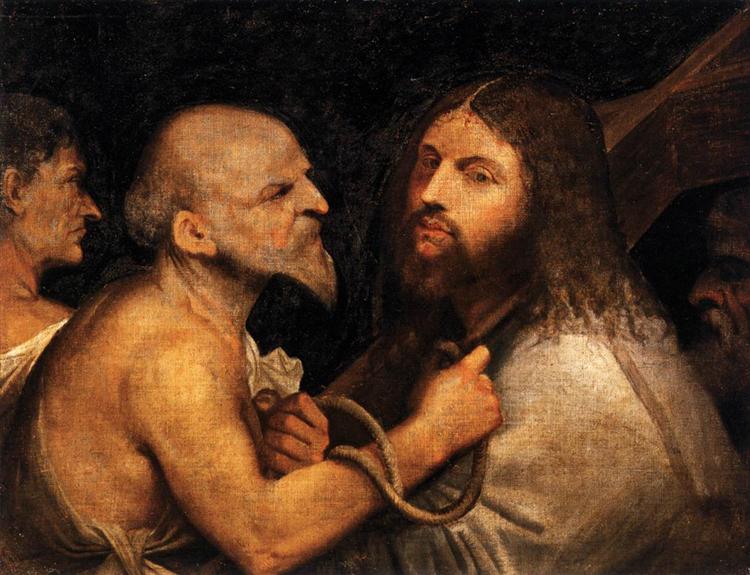Tanım
Titian's "Christ Carrying the Cross", painted in 1507, is an icon of the artistic mastery of the Venetian Renaissance, as well as being a moving representation of one of the most significant moments of the Passion of Christ. Titian, a painter who achieved renown for his use of color and his ability to convey emotions through the human figure, achieves in this painting a synthesis between the central figure of Christ and the drama of the subject he addresses.
The composition of the work focuses on the figure of Christ, who appears monumental and serene, despite the weight of the cross he carries on his shoulders. The way in which Titian presents Christ, with his bare torso, contributes to a sense of vulnerability and physical suffering. However, the upright posture and expression on his face suggest an inner strength that resonates with faith and redemption. This combination of fragility and strength has been a recurring theme in the work of Titian, who was noted for his ability to humanize the sacred figure.
The use of colour is equally significant in this work. Titian employs a rich and varied palette that includes earthy and vibrant hues that bring the scene to life. The warm colours surrounding Christ contrast with the darker tones of the background, accentuating the central figure and emphasising his importance in the narrative. Light also plays a crucial role; it is concentrated on the figure of Christ, creating a halo effect that suggests not only his divinity, but also a connection with the viewer, who is invited to participate in the reflection on sacrifice.
Throughout the work, Titian includes characters who contribute to the visual narrative. Although not all are clearly delineated, the figures of the soldiers and those accompanying Christ add a dimension of social and emotional context to the scene. The diversity of expressions and poses in these secondary figures provides a contrast to Christ's calm, reflecting the tension and violence inherent in the biblical passage. This focus on human interaction and emotional photography is characteristic of Titian's style, as he sought not only to depict divinity but also to capture the human experience in its entirety.
The work is not just a visual narrative; it is a dialogue with spirituality and human decency. The choice to represent Christ in the moment before his crucifixion invites a deeper contemplation of suffering and redemption. In this sense, "Christ Carrying the Cross" stands as a bridge between traditional sacred art and the innovations of the Renaissance, where the representation of the sacred began to include subtle nuances of the human condition.
In the context of the Renaissance, Titian is distinguished not only by his technique, but also by his ability to intertwine narrative with emotion, a trait that finds parallels in other contemporary works. Paintings by artists such as Giotto or Caravaggio contain echoes of the representation of the Passion, but Titian achieves a unique balance between the divine and the human.
"Christ Carrying the Cross" is an example of Renaissance art at its most moving. The work shows us how technique and symbolism can come together to offer a meditation on human suffering and redemption. Through his compositional ingenuity and masterful use of color, Titian invites us to experience not only the story of Christ, but also the essence of the human experience, in all its complexity and depth.
KUADROS ©, a famous painting on your wall.
Hand-made oil painting reproductions, with the quality of professional artists and the distinctive seal of KUADROS ©.
Painting reproduction service with satisfaction guarantee. If you are not completely satisfied with the replica of your painting, we will refund 100% of your money.

